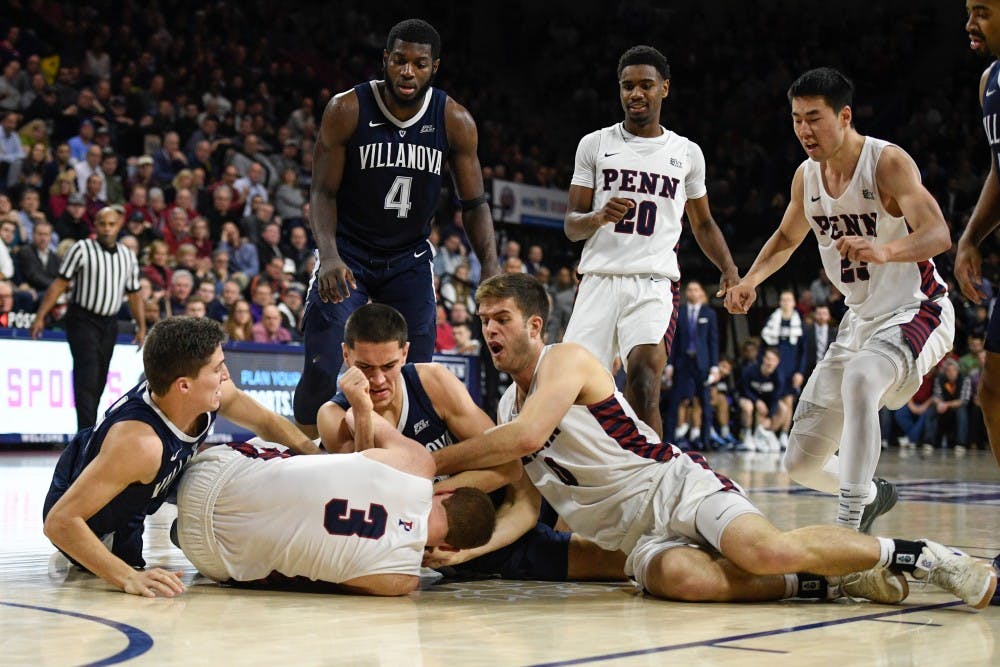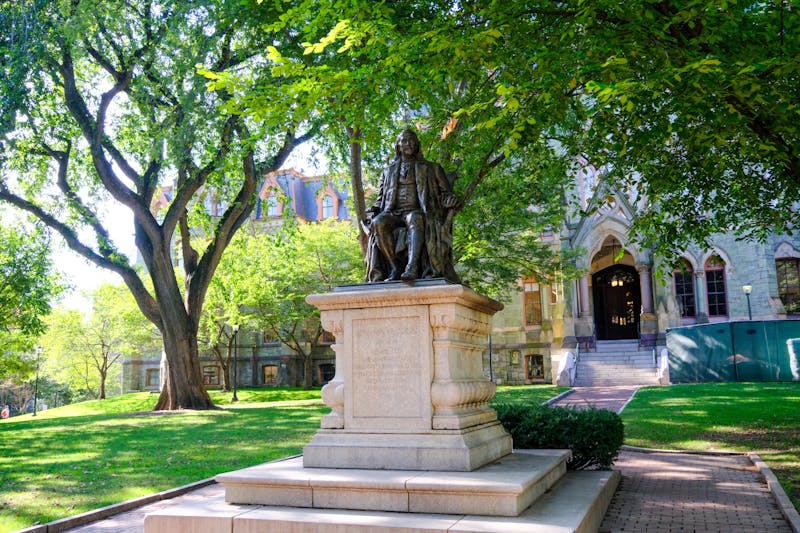
Seniors Max Rothschild (0) and Jake Silpe (3) fight for a loose ball against Villanova. The two have helped lead the culture of grit in the Quakers' locker room.
Credit: Chase SuttonAthletes and analysts love talking about grit. It’s a pretty great word. No other phrase as succinctly and clearly points to the scrappiness and perseverance good teams have and bad teams don’t. It has also been overused to the point of meaningless cliché.
Grit is used to refer to almost any positive trait not measurable on a stat sheet. Grit is a team’s ability to overcome adversity, to win in tight games, to play defense competently, to hustle, to care, to be tough both mentally and physically, to play with emotion, to want it, and to have that it-factor. It is all of those things and none of those things. What do you call a team that dives after loose balls and works in the face of adversity but loses tight games and lacks the it-factor mentality? Or the team that plays tough physically and hyper-emotionally but breaks down when faced with adversity? You can’t really be halfway gritty.
I’m not immune to overusing the word either: earlier in the year I wrote about Penn men’s basketball’s culture of grit through the sister cliché of the lunch pail mentality. The irony of an Ivy League school having a team that prides itself on workman-like grit is not lost on me, but there’s no way around it. This is the grittiest team I’ve ever seen. Everything they do is gritty. The way in which the Quakers came up with two of the biggest wins in their careers in a span of a week made me sure of it — Penn men’s basketball is the grittiest team in Philadelphia.
The Quakers showed the world last night — on national television — that they can overcome just about anything. There was evidence of their grit everywhere. They overcame foul trouble (the result of questionable officiating) that forced junior starters Devon Goodman and AJ Brodeur to the bench. Senior Jake Silpe slid across the floor for a loose ball that earned him a standing ovation from the Palestra crowd. One of the captains, senior forward Max Rothschild, who was playing hurt, earned two assists in a crucial moment, provided spirited energy, and promptly fouled out. They out-muscled the national champions in as physical and defensive a game the Big 5 has seen in recent memory. And let’s not forget that they’re playing without last year’s leading scorer in the injured Ryan Betley.
None of that mattered. This group found a way to win.
There’s a mood, a feeling around this team that they can do anything. I don’t know if that’s actually true — the losses to Kansas State and Oregon State suggest otherwise — but the feeling is real, and it is infectious.
“We’re not pretty but we’re gritty,” coach Steve Donahue told the team in the locker room.
The team burst into cheers, this among the few times being called “not pretty” is a compliment. Donahue is wrong about that part of it. The Quakers play beautiful team basketball, sharing the ball and the scoring and working together to defend as one. The personnel on the court seem to matter less than their collective energy and grit.
The last team I’ve seen that operated like that was also from Philly, a city with a knack for constructing the grit narrative out of thin air that I’m only beginning to appreciate. You might have heard of them — the Eagles.
They also lost perhaps their most important player due to injury but rallied behind an adopted mindset of grit all the way to a championship.
Grit is an overused cliché, but there’s a reason clichés are used so often. They point at something important.
Last year, Philly’s grittiest team won the title without their top player. Why not this year?

THEODOROS PAPAZEKOS is a College junior from Pittsburgh, Pa. and a Sports Editor for The Daily Pennsylvanian. He can be reached at papazekos@thedp.com.
The Daily Pennsylvanian is an independent, student-run newspaper. Please consider making a donation to support the coverage that shapes the University. Your generosity ensures a future of strong journalism at Penn.
Donate






